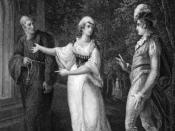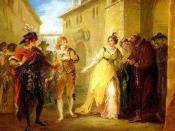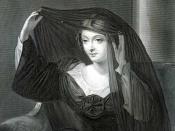This statement by Nietzsche applies to a great extent in "Twelfth Night" by William Shakespeare. Since it is a comedy, there certainly is a 'feast' of happiness and humour and therefore, there must be cruelty. Cruelty is shown in a number of ways, but it often coexists with disguise and things not being what they seem. The characters inflicting this cruelty have an inner 'Appolonian - Dionysian struggle', which is the reasoning and orderly side of their mind versus the feeling and chaotic side. When the Dionysian side prevails, it usually leads to cruelty except in the case of revenge when both sides agree with each other.
Friedrich Wilhelm Nietzsche was born on October 15, 1844 in the small German town of Röcken bei Lützen. At the young age of 24, he became the Professor of Classics at Basel University, at 26 he became a full Professor and at 45 he became insane.
He did a study on the existence of God and concluded that God does not exist, "Belief in God impoverishes human lives" and "Belief in a life after death reduces the dignity and the value of human existence now." He was known for making clear-cut conclusions with no reservations. In the year 1900, Friedrich Wilhelm Nietzsche died.
Cruelty in "Twelfth Night" is common throughout the play and since it is a comedy, it follows that cruelty must be a byproduct of happiness and humour. It is as Nietzsche said, "there is no feast without cruelty". In the case of "Twelfth Night", the 'feast' is the happiness and humour and the 'cruelty' is the general unkindness shown amongst the characters in Twelfth Night. The 'feast' enjoyed by one or some of the characters is often to the expense of others; this is the case when Malvolio is tricked, when Sir Toby tricks Sir Andrew about the challenge, in Olivia's treatment of Duke Orsino, in Malvolio's manner of treating others, in Cesario's treatment of Olivia and when characters take out their revenges.
When Malvolio is tricked by the under-the-stairs crowd (Sir Toby, Sir Andrew, Maria and Feste), they take joy from inflicting cruelty upon Malvolio. It is debatable on whether Malvolio deserves this treatment, this means that in the minds of the characters/Shakespeare an Appolonian - Dionysian struggle is taking place. The Appolonian side would be reasoning that he does deserve it because of all the grief and humiliation he has caused to others, while the Dionysian side would be feeling slightly compassionate towards Malvolio hoping to forgive and forget, but this is not enough to overcome the reasoning of the first argument. They decide to make him humiliate himself in front of Olivia to teach him a lesson and to make him have some humility. Instead of 'taking a bite of humble pie,' he claims rather nastily, "I'll be revenged on the whole pack of you". This was not the effect that the pranksters had originally intended. Malvolio just took it as an insult and became even more hostile than before. This is an example of how Shakespeare portrays the themes of disguise (in Malvolio's cross-gartering and yellow stockings), things not being what they seem (Malvolio not learning his lesson), and that 'there is no feast without cruelty'.
Malvolio's treatment of others in the play justifies the trickery he was subjected to. He has ideas above his station that are all revealed when he is watched in the garden; "You must amend your drunkenness [to a hypothetical Sir Toby]" (II, v, 69). Sir Toby is astounded and disgusted at this and he shows it: "Out, scab!" (II, v, 70). He is extremely arrogant towards those of a lower social ranking than himself but he only shows arrogance towards his superiors when he thinks he is not being watched. Malvolio gets joy from insulting others lower than him in social ranking and being cruel to them; this alone would be enough to make him deserve punishment but blatantly insulting superiors (Toby) behind their backs is going too far.
Revenge is a classic example of when "there is no feast without cruelty". Revenge is sought by Feste when Malvolio purposely offends him in front of Olivia. This is when the 'feast' is Malvolio's pleasure gleaned from the 'cruelty' of making Feste look like an idiot, when in fact; the 'fool' is more intelligent than all the other characters in Twelfth Night. Feste does not like being made a fool of, so he carefully plots his revenge along with the rest of the under-the-stairs crowd to pay back Malvolio in a similar way - make a fool of him in front of Olivia. When he walks in cross-gartered and with yellow stockings, smiling like an idiot, Olivia thinks he has gone mad. This is the 'feast' for the pranksters and the justified 'cruelty' for the steward. When Malvolio is locked up for no reason and proclaimed insane, this is going a bit too far. It is only really Sir Toby and Feste that still feel the need to punish him and have their Dionysian side still dominating. This is because they were the only ones individually targeted with criticism. When all is revealed to him, he says he will be revenged on those who were revenged on him. This does not really make sense since it is apparently 'even' now. This shows that Malvolio is "sick of self-love" (I, v, 89) and takes things too seriously - "bird-bolts ... you deem cannon bullets" (I, v, 92). He deserved all that he got.
In conclusion, the statement made by Nietzsche: "There is no feast without cruelty" applies directly to situations in Twelfth Night. The characters do not like being made fools of and therefore have a strong sense of revenge. This works to Malvolio's disadvantage as all the things he had done to anger or annoy people came back and hit him where it hurt him most - his pride. From this, it can be concluded that Nietzsche's statement is very much true for the play "Twelfth Night".


